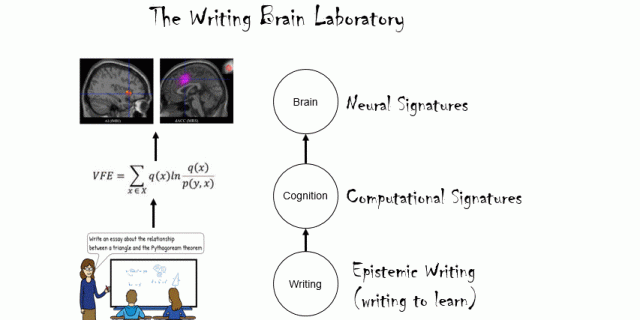
By
Roberto Limongi
March 2024
Print Version
What you need to know
Through writing, we communicate our discoveries—discoveries that will cause changes in the world. While we write, however, our brains and minds change, especially when we purposely write to learn. Philosophers and poets have known this since ancient times. The goal of my research is to find robust experimental evidence of this longstanding belief by observing the effects of writing-to-learn activities on the brains and minds of students.
Why this research is important
The importance of this research rests on fulfilling two educational needs: making academic learning a more individualized experience and overcoming the existential crisis that academic writing has been facing since the advent of artificial intelligence-based language models.
First, we currently know that writing consolidates knowledge more strongly in our memories than speaking. However, the learning effect is not the same for every student. By knowing the brain mechanisms that cause this variable effect, we will be able to personalize writing activities to individual needs—making education more diverse and inclusive. Second, identifying the brain signatures of this learning effect would allow educators to clearly separate the uniquely human properties of academic writing from those properties shown in artificial systems. Crucially, educators would have a convincing response to a question that is omnipresent in discussions about the usefulness of learning to write in academia: If an artificial intelligence system can produce a text for us, why should a student learn to write at all?
How this research was conducted
With university students, we searched for experimental evidence of the learning effect of academic writing—a stronger effect than that produced by spoken language. We asked students to read short texts about academic content. After finishing the readings, they either wrote or spoke short essays and performed memory tasks about words presented in the texts. We found that students retrieved information much faster from memory after writing their essays than after speaking. We referred to this effect as “the epistemic effect of writing.” We then asked how the mind and the brain produce this epistemic effect. To answer this question, we observed the brains of schizophrenia patients with speech and thought disorders.
What the researcher found
We identified two regions of the brain that work together as a team and showed changes in their connections during language production—neural changes associated with changes in the world knowledge of the patients. We suspect that these two regions subserve the epistemic effect of writing as well. Therefore, we created a computational model of the epistemic effect on the writing brain which we will soon test experimentally in our laboratory in collaboration with Dr. Nicholas Watier (Department of Psychology at Brandon University).
How this research can be used
Teachers and clinicians can use this research to pursue the identification of linguistic, computational, and cognitive signatures of language in general. In academic writing, specifically, teachers will be able to use computational applications to assess how much a student has learned through a writing activity and, crucially, whether the writing has been produced by the student or by an artificial intelligence system as the computational applications will identify the linguistic phenotype of a given student. This phenotype, by definition, would differ from that of an artificial mind. Furthermore, because schizophrenia shares symptoms and neural causes (observable in language production) with developmental disorders (e.g., autism and ADHD), our research will, in the future, allow us to investigate the effectiveness of clinical and educational interventions in these populations of students.
Writing-brain laboratory
Webpage: https://people.brandonu.ca/limongir/home/the-writing-brain-laboratory/
Contact: writing-brainlab@brandonu.ca
Acknowledgements
This project is currently funded by the Brandon University Research Committee (BURC) Award.
About the Researcher
Keywords
- academic writing
- cognitive neuroscience
- educational neuroscience
- writing to learn
Publications Based on the Research
Limongi, R., Silva, A. M., Mackinley, M., Ford, S. D., & Palaniyappan, L. (2023). Active inference, epistemic value, and uncertainty in conceptual disorganization in first-episode schizophrenia. Schizophrenia Bulletin, 49(Suppl_2), S115–s124. https://doi.org/10.1093/schbul/sbac125
Silva, A. M., & Limongi, R. (2019). Writing to learn increases long-term memory consolidation: A mental-chronometry and computational-modeling study of “epistemic writing.” Journal of Writing Research, 11(1), 211–243. https://doi.org/10.17239/jowr-2019.11.01.07
Editor: Christiane Ramsey
Read more BU Research
Research at Brandon University follows comprehensive policies designed to safeguard ethics, to ensure academic integrity, to protect human and animal welfare and to prevent conflicts of interest.

